The IPR community pays tribute to IPR Trustee Mark Weiner, one of the founders of the IPR Measurement Commission and longtime Trustee and IPR supporter. We are deeply saddened by the loss of Mark Weiner, longtime IPR contributor, measurement expert, and friend to the public relations industry. In 1994, Mark began a long career working in research and insights at PRIME Research, Cision, Delahaye, Public Relay, and Ketchum. In 1997, Mark helped launch our IPR Measurement Commission, our oldest and largest IPR Center of Excellence. He served as chair in 2004 and then returned in 2017, when he served as director for two terms. Mark published two IPR signature studies. In 2016, he co-authored with Dr. Sarab Kochhar, “Irreversible: The Big Data Revolution,” and in 2021, he was the primary author on “The Communicator’s Guide to Research, Analysis, and Evaluation.” Mark also served on the Board of the Museum of Public Relations and was a member of the Page Society.In 2018, Mark received the IPR Jack Felton Medal for Lifetime Achievement for his contributions to measurement and evaluation. When I told Mark he had been nominated for the award and could not serve on the awards committee that year, he sent in two additional nominations. Despite the additional competition, he did win that year. When Mark received the award at the IPR Annual Distinguished Lecture, Braden Bledsoe introduced him. After showering him with accolades, she revealed that as a fellow communicator and marketer, she knew him so well because she was his wife. Mark said receiving that award was one of his career highlights because it demonstrated his impact on the field and his willingness to help others in the spirit of former IPR CEO Jack Felton. Mark also was a PRNews Measurement Hall of Fame winner.Mark also sponsored awards for IPR when he worked at PRIME Research, offering graduate students a fellowship, work experience, and the opportunity to contribute a research paper to IPR. He continued that support when he went to Cision (and today that award continues thanks to his longtime colleague Chelsea Mirkin). For several years until COVID-19, we co-hosted the IPR-PRIME Conference with Mark.Mark and I also co-authored a Ragan column in a “banter-style” format for several years. In 2021, Mark published his latest book, “PR Technology, Data, and Insights,” and asked me to write the foreword, which I was honored to do. The book showcases his love for measurement and offers practical advice for anyone getting started or those well on their measurement journey.In 2019, Mark was a guest on “In A Car with IPR,” which we shot on a very hot and humid day near his Ponte Vedra Beach, Florida, house. He offered the best advice he’d ever been given and quotes that inspired him, such as, “Begin simply…or simply begin.” He loved watching black and white movies on the classics channel, and “The Grapes of Wrath” was his favorite. Here’s an excerpt from his favorite song by The Kinks, “This is Where I Belong”:I can’t think of a better place I’d rather beThe whole wide world doesn’t mean so much to meFor this is where I belongThis is where I belongDuring filming “In A Car with IPR,” I asked him, “If God does exist, what do you want him or her to say as you enter the Pearly Gates of Heaven?” he answered, “Welcome! With a big smile.” In the style of “The Kinks,” he added, “This is where you belong.” We’ll miss you, Mark, and thank you.Mark’s family will host a celebration of life for his industry friends and colleagues in New York sometime in January.You can watch his “In A Car with IPR” episode here and the deleted scenes from that episode here.By Tina McCorkindaleIPR President and CEO
Below are memories offered by some of his closest friends, colleagues, and fellow Board members:Mark will be deeply missed. He was an amazing leader, talented professional and caring individual. His significant contributions to IPR and the measurement commission will always be remembered. Sending deepest condolences to his family.-Patricia Bayerlein, Gagen MacDonaldMark was one of the kindest people I had ever met. He was the first IPR Board member I got to know, and we spent time together over lunch and calls talking about the Board, life in communications, and goals about the future. He was curious and funny, and a visionary – with a sense that anything was possible. And I remember during the pandemic he reached out to just check in – to make sure I was doing ok, both in work and in life. He will be truly missed, and we lost one of our greatest friends and advocates.-Bill Chandler, LululemonMark was a great guy. Full stop.He was a top researcher, consummate professional and good friend who was always ready, willing, and able to provide safe advice. I have many fond memories of Mark from IPR board meetings, dinners, and retreats. His amazing smile and ability to discuss virtually any subject (and provide a fresh perspective) was unique.Mark not only kept urging me to write a book but introduced me to his editor who, in turn, introduced me to an editor at McGraw-Hill. He was one-of-a-kind and will be sorely missed.-Steve Cody, PeppercommA fine man and leader, Mark’s contributions and personal commitment to raising public relations standards and practices were invaluable. So many times over the years, he generously offered his time and counsel to Newhouse students through guest-lecturing and personal mentoring, showing us all that there was a genial, caring individual behind his research, writings and other work. Mark will truly be missed, but his work with IPR and numerous professional groups, colleges and universities, and individuals will endure.-Tony D’Angelo, Syracuse UniversityWhen I think of Mark, the word that comes to mind is “generous”. He was generous with his time; he was generous with his insights, and he was incredibly generous with his knowledge. I first met Mark through IPR, and I remember being struck by how deeply engaged he was in the community and mission of IPR. Mark was one of a kind and he will be missed.-Maureen Davenport, KPMGMark Weiner was always curious, and his thoughtful questions helped us improve our program at UF and helped the PR profession in many ways over the years. Mark showed up for what was important. He was especially passionate about elevating our profession by preparing future leaders. This led to his successful career, his extensive industry engagement, his book, his frequent guest lectures, and plans for him to teach a course. In 2016, Mark and I both presented at an IPR event in London. After the session Mark asked if I would give him honest feedback if he provided honest feedback on my presentation. Of course I agreed, but what I didn’t realize was that this agreement would extend to all presentations. After his presentations he would ask what I thought and always shared his thoughts on mine – I didn’t even have to ask and his feedback was usually quite entertaining.Mark was truly one-of-a-kind—he cared deeply and always made time for others. His passing is a loss for our industry.-Marcia DiStaso, Ph.D., University of FloridaIt has been a privilege to have counted Mark as a colleague and a friend. He was a pioneer who never wanted to settle. He balanced smart and strategic thinking and approach with a desire to invest back into our industry and mentor those who are coming up behind him. He was generous in sharing his success and seeing the best in others. Farewell my friend, I will miss you. –Pauline Draper-Watts, Abacus Insights PartnersAttending a large meeting as a new member of Page Society or a board like IPR can be overwhelming and even intimidating. Mark was the first new friend I made in both, and I will never forget how welcoming he was, despite his status as a longtime member. His kindness, humility and self-effacing humor made every event comfortable and enjoyable, and I will miss him.-Laura Duda, The Goodyear Tire & Rubber CompanyMark was a measurement hero, a mentor, and a friend. He could easily be attributed for my path in PR measurement. Don Wright introduced me to him at my first IPRRC conference as a graduate student—shortly after I was interviewing for a role in media measurement at PRIME Research where I started my career after graduate school. When I took on a new role involving sales in Brazil, he took time weekly for a sales training session. He didn’t have to do this, but he did to mentor me and help me excel—He wanted to push me and see me succeed.Since the beginning, he has always been a mentor and a cheerleader to me. At a recent industry conference, he watched my presentation and I remember his proud look—like a proud father! Beyond the profession, he was such a kind and supportive person. He was there on the night of my first date with my husband—a PRIME Research holiday party. We still use the vase he gave us at our wedding—he made sure to tell my husband to always keep it full of fresh flowers! Mark has left a mark on our profession and our hearts. He will always be a celebrated hero to me. I still use the line he taught me every day in my work—PR measurement proves value and improves performance!-Angela Dwyer, FullintelAs one of the legions of Mark’s colleagues and friends across the profession, I cherished Mark’s brilliant research findings and insights, his wonderful sense of humor, his many kind and gracious gestures, and his tireless spirit. In my recent years in education, I can also attest to his generosity toward emerging talent. He deeply loved spending time with students and was one of the best guest lecturers I’ve had the privilege of welcoming to Gainesville. He was an impassioned champion for our profession, which he so dearly loved. I hope all the IPR trustees know that he was at least as passionate a champion of IPR, which he also dearly loved. He will be dearly missed. RIP, my treasured friend. –Pat Ford, University of FloridaMark was one of three true career mentors I’ve had. More important than that Mark was a true friend, whose advice and humor carried well beyond our professional association. Mark is the one person on the IPR measurement commission who stayed in touch with me during a short hiatus, and encouraged me to rejoin the commission, and continue to give back to IPR and our profession. It’s one of the best personal and professional decisions I’ve made, and I appreciate him so much for it.Mark is a legend, and his place in furthering our profession will always be remembered.– Jason Forget, CognizantMark Weiner epitomized everything that is good about our profession! High Integrity. Professional. Knowledgeable. Empathetic. Sincere. Collaborative. Most of all an incredible colleague and friend!There are no words to express his loss. Mark made what we do meaningful, and he did it with a smile. Condolences to his family. RIP Mark!-Gary Grates, Grates Consulting GroupWhen you were in Mark’s presence, you were always greeted with the most genuine smile—and that smile was always bigger and brighter if you were talking about PR and measurement. His passion for our industry was inspiring to all of us, and I will miss his insights, partnership, and our discussions a great deal. His wisdom and expertise were unparalleled and truly cherished by many of us. His legacy will forever live on, and it will continue to be a shining example of commitment, dedication, and passion for our industry. Rest in peace, my dear colleague, Mark.-Yanique Griffin-Woodall, CVS HealthMark was truly a special person. Servant leader, incredibly humble, generous with his time, and most of all, a class-act as a human being.Throughout the 11 years of our friendship, I learned so much from Mark. On the one hand, it’s difficult to think of anyone else who has had such a profound impact shaping the future of public relations and communications. On the other hand, there are so many of us who Mark touched on a personal level, as well. I know that I will not only be a sharper communications practitioner because of Mark, but I will also have a shot at being a decent husband, friend, and human-being because of the lifetime of lessons he was kind enough to share with me. Truly one of a kind.-Mohammad Hamid, Gameplan ManagementWhen I was a new employee at IPR, Mark was one of the first Trustees to welcome me. He took it further and made an effort to get to know me. At my first Bridge Conference, he took the time to chat and discover what had drawn me to the industry and to the organization. We shared a hearty laugh when I revealed the profound influence the TV show, “Bewitched” had on my professional path. He shared his memories of watching that show and the professional lessons he gleaned from it as well. That was one of Mark’s many gifts—the ability to connect with anyone about anything—and make them feel welcomed, valued, and seen. Mark offered himself as a resource in his kind and friendly way.I will be eternally grateful for the moments I had with him to laugh, to learn, and to be in his gracious energy. He will be missed.–Anetra Henry, Institute for Public Relations Mark was a shining light in our industry as a thought leader and in our lives as an exceptional human. Equally generous of mind and kind in spirit – he made so many of us better. To be in Mark’s orbit was to feel seen, heard and valued. Grateful for the minds and doors that he opened – and the many careers he influenced across our industry – including my own. He will be truly and deeply missed.-Allyson Hugley, LinkedInI was first introduced to Mark and his work in the early 2000s as I was working at the reputation insights intersection of stakeholder perceptions and media. From when we first met, the thing that has struck me about Mark was his unique ability to balance driving successful commercial organizations forward, while at the same time always bringing a sense of calm, patience, and friendly demeanor. Mark was unflappable and truly one of the good guys in the industry.Although many of our discussions focused on the use of research and insights to accelerate the relevance and impact of the Communications function, as time went by much of what I increasingly looked for and appreciated in our conversations were his thoughts on life, family, and gratitude.Mark, I’m grateful for the perspectives you shared and feel privileged to have called you a friend. You will be missed. Rest in Peace.-Rob Jekielek, The Harris PollA decade ago, our paths converged as I led Symantec’s global communications, and it was during this time that I had the privilege of meeting Mark. He played a pivotal role in my professional life, instrumental in introducing and championing my nomination at IPR and Page. What started as a partnership in the corporate realm quickly transformed into a genuine and lasting friendship.Mark was generous with his time and wisdom, with a selflessness that defined the depth of our connection. Beyond the confines of the workplace, Mark became more than a colleague; he became a true friend, always ready to offer guidance and support. Our conversations evolved beyond work-related matters, touching on the essence of life and the meaningful relationships we build along the way.As our friendship blossomed, so did our discussions about our families. Mark, a quintessential family man, took immense pride in his sons’ achievements. His love for his family was evident in every conversation, and his commitment to their well-being was unwavering.With a heavy heart, I bid farewell to Mark, leaving a treasure trove of memories that showcase the remarkable person he was. I will miss his warmth and guidance deeply. In this time of mourning, I find solace in the richness of the moments we shared and his indelible impact on me.As I say my goodbye, I will remember and cherish Mark for the exceptional human being he was – a friend, a mentor, and a loving family man. May his soul find eternal peace, and may his memory continue to guide me.-Kerman KasadIt’s clear Mark touched many people in many ways- professionally and personally. For many he is viewed rightly as a pioneer in media measurement. It is an unfortunate reality that in this world of business, too often we only get a one-dimensional view of someone. If we’re lucky, we sometimes get a two-dimensional view and get to know people on a more personal basis, usually at events and conferences and maybe at those after hour bar chats.Rarely do we get to know someone in their complete three-dimensional being. Their quirkiness, their eccentricities, their struggles, and their love of all that we often do not see. Many of us are understandably perhaps reluctant to share, thinking we may be judged. But as the writer Henry Miller once wrote, “the world is so rich, simply throbbing with rich treasures, beautiful souls and interesting people.”Mark was one of those. While I knew and respected him for years, what I didn’t know until last year was more of his backstory. It turned out over some chats at a conference where he encouraged me to get more involved with the Institute of Public Relations, I realized I had unknowingly bumped into his son, Graham, in Costa Rica where I have a place and since then we’ve started to work together building out a vegetable farm for me.I learned Mark was braver and more courageous than I had ever known. Behind his wit and humanity and advocacy for the industry he had once had a rare cancer that had him in the hospital for two years. Yet he never once mentioned this to me or complained of some of the struggles he had after. He was always quick to smile, joke and provide a wry wise observation in his Steve Carrell-esque manner. While we all mourn his loss and provide testimony to how he touched our lives, I was reminded by Graham that his father also had a side not everyone saw – a lover of rock n roll and loud music – of the Ramones, Beach Boys, the guitar. He lived his life fully. I feel fortunate to have gotten a glimpse of him not just as a professional but in all his dimensions. And while tragic, Graham communicates that he now believes his father is at peace. RIP mark. It was an honor to know all of you. Behind that measurement maven cloak pulsed the heart of a rock star. Your memory and impact will rock on.-Rob Key, Converseon I first met Mark when he was CEO of Prime Research – our fiercest competitor in the market. Little did I know that 5 years later, Mark would join PublicRelay as our Chief Insights Officer and he would become a dear friend. Mark was truly a pioneer in our industry, thinking in new ways about how data and smart analytics could make us better at our jobs and more credible in the C-Suite. Always quick-witted and armed with a dry sense of humor, Mark made us smile even on the toughest days. I will miss you, my friend. We all will miss you.-Eric Koefoot, PublicRelayIt’s always challenging to walk into a room full of strangers. That was me a few years ago when I walked into the Institute for Public Relations’ Bridge Conference in Washington DC. It was early and the room was nearly empty. Mark Weiner was sitting nearby eating breakfast. I didn’t know him, but I knew he was a veteran of the field who’d been with IPR for many years. But he was also just a guy eating breakfast. He greeted me warmly and asked me about myself. I reciprocated.We learned we had common ground on a passion for research-driven advisory work in public relations. If you’d seen us chatting, you’d have thought we were discussing a hot sports take or a common passion for a band or an artist. Yes, we geeked out. And in the process, struck up a friendship.A few months later, Mark reached out to me. He’d seen an ad for a senior role at my firm, an old one that somehow persisted beyond its useful life in some search engine algorithm. He was looking for something new. I explained the error. But again, we talked about the business and the approach my firm was taking and what he wanted to do. He was gracious and encouraging. Just under a year ago, Mark learned I was being named the IPR board liaison to the Measurement Commission, a post he was vacating. He reached out again. True to form, he gave me great advice about the group, the role I was taking on and how to make it meaningful. He wished me luck.I didn’t know Mark very well, but it felt like he was a kindred spirit on the business approach. I was so grateful to find a senior person interested in what I was trying to do, and supportive. Beyond that, I could tell he was a genuinely good person. I felt his curiosity, passion and wisdom in every interaction. He really cared about people. From what I can see on various testimonials about his passing, he left a strong legacy of mentorship and friendship throughout our field. I’ll miss him, but I’m glad to know I can find that legacy at work in many of my friends and colleagues.-Mike Kuczkowski, OrangefieryMark was an expert in our field, yes, but I enjoyed seeing him for reasons that supplemented his expertise. Jocular and voluble, Mark and I talked at our regular encounters about the arts and food, mostly, and most recently whether a vegetarian diet was worth it and what made food pleasurable. He had a great persona, was a great colleague, and I’ll miss him very much.-Brian Lott, MubadalaIn 2015 when I was starting one of my largest ever research projects (The Organizational Listening Project) and needed to interview organization leaders in the US as well as the UK and Europe for sample balance, Mark not only connected me to some of his clients but also gave me use of an office in his E. 42nd St, New York premises as my NYC base. Such was his generosity. I will miss the many friendly discussions on measurement and evaluation.-Jim Macnamara, Ph.D., University of Technology, SydneyMark was, by anyone’s estimation, a true mensch. I got to know him about ten years ago — and from the jump he was kind, witty, generous with his time, knowledgeable and gracious. One of my favorite people to see at an industry event, he always had an interesting take, a sardonic quip, or a connection to make — or, more likely, all three! He was the first of my fellow trustees at the Institute for Public Relations to reach out to me to show me the ropes and ensure I found birds of a feather. This Hanukkah, as the candles on my menorah burn brightly, I’m thinking of Mark and how his light shines on through the positive impact and memories he leaves behind.-Ethan McCarty, IntegralI know I already talked some about Mark, but I wanted to share some personal insights. Mark was terrible at hiding his facial expressions, so if you really wanted to know how he felt, it was better to do a video call. Mark was funny and witty. He sent me texts like, “I’m here with Steve Cody. We’re talking about you, and I wish you were here to defend yourself.” And he said, “I just received a thank you note from IPR with your signature. But it doesn’t read like you. It’s sincere, gracious, and full of gratitude. Nothing snarky. No corrections…I think someone is impersonating you. Has anyone else reported this?” He also had some dad jokes. When people asked him how to pronounce his name, he would say, “Weiner, like the hot dog,” followed by, “Don’t you RELISH that?” and “Let me be FRANK.”Mark always remembered my birthday (and my son’s birthday because his birthday was also on May 4). He sent me words of encouragement on the morning of our major IPR events like, “Good morning. Today is YOUR DAY. TAKE NO PRISONERS!” Or, he would send me notes at the end of the year wishing me joy for the following one.I was fortunate to work with Mark on many projects through IPR through our events and research together. It’s sad to think that I’ll never speak to him again, and I still don’t think his death has sunk in fully. I’m sending much love to Braden (who he called his bride) and his sons, Graham and Cameron. Thank you for sharing your husband and dad with us. He loved you all so much, and he made a difference to so many in our field.-Tina McCorkindale, Ph.D., Institute for Public RelationsI first encountered Mark when he was receiving the Jack Felton Gold Medal award, his wife Braden left it to the last second to reveal that she was introducing her husband. It was a wonderful surprise, a mic-drop moment.Like that moment, Mark was full of surprises – he was kind, thoughtful, generous with his time and network, and always championed me and my firm. Mark was a wonderful blend of humor, confidence, and humility. He knew what he excelled in (and there was a lot) but was also aware of his limitations – and that was part of his appeal.I will be thankful for the time we spent together, especially his counsel to a fellow outsider in the world of PR. Our industry lost a giant this week, but his legacy will endure.-Jamie McLaughlin, Monday TalentThe public relations community lost a thought leader, mentor and colleague who deeply cares about the profession. I had the opportunity to serve on the PR Daily Advisory Board where Mark Weiner was also a member. Mark is a lifetime advocate for PR research and the measurement of public relations values and outcomes. I worked on different research projects related to PR measurement and measurement tools in corporate communications. Because of Mark’s expertise, I reached out to him several times and invited him to share his input and critique. Mark always responded to my interview requests and graciously shared his experience and feedback. He would follow up to make sure his comments are helpful and is willing to offer more time to “sit for an interview or a session to expand on [his] responses.” Spending time with Mark discussing the importance of empowering PR students with research skills and appreciating the role of research in advancing the industry is always a highlight of his incredible contributions. He will be deeply missed by so many. Rest in peace, Mark.-Juan Meng, Ph.D., University of GeorgiaI feel so lucky to have worked for Mark for a decade and gotten to know him as a professional and as a friend. I have spoken to countless former colleagues and clients in the past few days and the same threads run through every conversation I have had.As a friend, he was invested, loyal, supportive, and personable. As a colleague, boss and mentor, Mark made us feel included, valued, confident, special, respected, heard, and loved. So many attribute their careers to Mark’s thoughtful guidance and unwavering support. He was endlessly generous with his time and quick to attribute his success to the contributions of others.As a practitioner, Mark contributed to the science and art of public relations measurement, but more than that, he built up a community around that practice. This is Mark’s gift and unique legacy, and one which will undoubtedly continue to impact us all for years to come.Love and miss you, Mark. I am so grateful for our friendship. May you rest in peace.-Chelsea Mirkin, CisionI had the good fortune to know and work with Mark for many years. Our teams worked together while at Mastercard and again at KPMG. On a professional level, Mark’s dedication to his craft and his passion for insights-led, data driven communications was unparalleled. But more than our shared professional work and accomplishments, I’m most proud to have called him friend. I will greatly miss our regular chats and our many shared laughs. Mark was one of the good ones. He will be missed.-Chris Monteiro, WiseMark was a fierce advocate of public relations research, measurement, and outcomes-based communication strategies. Not only was Mark a founding member of the IPR Measurement Commission in 1997, but he also served as chair for many years and remained an active member for the other years. He was a regular contributor at professional conferences, and he authored significant and widely cited PR measurement white papers and articles and books, most of which I read and assigned to students in my public relations and research classes. He shaped my teaching and scholarship. But perhaps most important, Mark mentored and championed hundreds of public relations practitioners, including me. When serving as chair of the IPR Measurement Commission, Mark would call me on occasion, asking me questions that prompted me to think differently or to do more. He was always among the first to congratulate or champion someone on LinkedIn. My sincerest condolences to his family and loved ones.-Julie O’Neil, Ph.D., Texas Christian UniversityMark wanted to be an IPR trustee probably more than anybody who joined the Board while I was CEO. This was before there was an executive committee, and as important as that has been to the development of IPR, before those interpretations of the rules came mainly from the CEO. So, we put Mark’s boss in Europe on the Board and had Mark serve as his representative on practically everything. And Mark quickly proved how much he deserved to be a Trustee.-Frank Ovaitt, Ovaitt Land Holdings, LLCMark was my biggest champion in the comms measurement industry. He encouraged me to join the IPR Measurement Commission and nominated me for the Measurement Hall of Fame. I credit him with so much that I have learned in my craft and for the invaluable relationships I have made. More importantly, Mark also became a friend. He had the kindest heart and was so willing to openly share his knowledge and his personal life experiences, and I am so grateful for all that he taught me. It is absolutely heartbreaking to know he will no longer be a part of this special community and my life in general. He will be dearly missed.-Elizabeth Rector, CiscoThe communications world has lost a true luminary with Mark’s passage. He was a friend, colleague, and mentor. I feel indebted to him for having brought me into the IPR world, first onto its Measurement Commission, later encouraging me to run for its Chair, and then to engage with AMEC. If I think of a single word to describe Mark, it would be the Yiddish term, Mensch. He was someone you could count on to lead thoughtfully, to do what he said, to say what he meant, and to set an example which many of us follow to this day.–David B. Rockland, Ph.D., Rockland and DuttonI join so many Public Relations and Communications practitioners and educators in mourning the loss of Mark Weiner. The December 10 news came as a shock, the response was immediate, universal in its praise for the professional, the research guru, and it was heartfelt for the loss of a true friend. I remember Mark as a life-long learner, and as a practitioner-turned educator, I admire Mark for his humble approach to our profession and to life. Yes, he was a leading figure in research, a sought-after conference speaker and author, but it was his post-lecture interaction with his audiences that I will especially remember. Over the years, Mark visited my Newhouse undergraduate students, the mid-career practitioners in our executive master’s program, and chief communications officers in our Newhouse/Aberje program in Brazil — encouraging all to advance their careers and the profession by engaging in research, applying that research, then sharing their research. But those formal lectures always ended with Mark interviewing those students to gain from them new insights, new takeaways, new applications to his own work – the mark of a life-long learner, and a role model for all of us.-Maria P. Russell, Syracuse University and the Commission on Public Relations EducationMark was a wonderful individual to get to know, both personally and professionally. He helped encourage me in our measurement practice at Southwest and was a constant source of information, guidance, and advice. He always had a smile and a kind word to offer. He helped spark my continued learning in the measurement space – and he was available to my staff to ask questions as they continued their understanding of measurement and analytics (and mostly how to tell the right story about the data we’d collected). He will be missed. Rest in Peace.-Linda Rutherford, Southwest AirlinesMark was my very first introduction to the world of analytics and measurement. I still remember vividly meeting him at the Mastercard’s headquarters as we got a tour of their industry leading measurement and analytics infrastructure, a first for the industry. Mark was curious, knowledgeable, and most importantly he always led with his personal touch or midas. From working on our first project together at Capital One to being industry experts serving together on the IPR measurement commission to joining my class at Georgetown every semester as a guest, Mark was a constant in my life and had an incredible impact both as a human and most importantly as a communicator. He always met you with a big smile, he loved a good discussion around measuring the ROI of PR and he never let go of an opportunity to pitch why every communications leader should be investing in measurement and analytics. I still remember fondly getting his book in the mail signed, “your friend, Mark.”Mark, thank you for your friendship and partnership. Thank you for being my loudest sponsor in the room. You will be missed dearly. Until next time my friend!–Sukhi Sahni, Wells FargoMark was an advocate for both the profession and the professional. When he nominated me for the IPR board, it seemed out of left field at the time. He was steps ahead of my thinking and I’m eternally grateful for his supporting me to be an IPR trustee. Mark was steeped in data and analytics, but his true calling was connecting and supporting the people in his world.-Diane Schwartz, RaganMark was passionate about his work and always selfless in sharing his knowledge. We became friends over many years, and he always wanted to help, to teach, to listen, and to be a friend. His contributions to data, analytics, and insights for all of us in the communications business have been instrumental. His warm smile, friendly demeanor, and sense of humor will be terribly missed by me and by so many who had the privilege of calling him a friend. My deepest sympathy goes to his family.-Eileen Sheil, Weill Cornell MedicineMark was one of the most passionate advocates for measurement ever in our field. He also was a natural “independent” as a person, and de facto educator who could be counted on to provide an objective view of issues, trends, and the state of the world in our conversations.-Jim Simon, Simon and Associates Mark Weiner was a champion for public relations, both the industry and education. He visited our campus at Quinnipiac many years ago to speak to graduate public relations students about the importance of measurement in public relations and was always willing to talk with a student about their careers even as recently as this past semester. I will always remember his willingness to help and to go above and beyond. After our last phone call, he sent me a note thanking me for spending some time with him to talk. But I will always be thankful for the time we shared.-Hilary Fussell Sisco, Ph.D., Quinnipiac UniversityThank you, Mark, for always leading the way and being an amazing role model for me and so many others on PR Research and Evaluation. There are few who make a true difference, advance us in ways which are so important to this profession. You are one who has done so, many times over. Not only do I thank you from the bottom of my heart, but I thank you for all those who never even knew you were so instrumental in their achievements, their commitment to being better professionals by listening more effectively through good research. Thank you for being such a great guy and friend. I will miss you as so many others will. Holding you in the light.-Stacey Smith, Jackson, Jackson, & WagnerI will miss my conversations with Mark Weiner. He had a unique perspective on most things and an ability to put concepts into practice and then explain them. We agreed more often than we disagreed, serving on several commissions and professional associations. We called ourselves “sole brothers” as if from the same family with different opinions. Mark was a pioneer in public relations measurement and his works have impacted on many professionals. He will be missed.–Don Stacks, Ph.D., University of MiamiWhile I did not know him well, he was instrumental in my early exposure to taking Comms measurement seriously as a profession. He always challenged us to be thoughtful and rigorous in all aspects. I appreciate that greatly. He will be missed.-Eve Stevens, MicrosoftOne of my few genuine regrets about my journey through the PR measurement & evaluation world is not having joined Mark at PRIME Research in 2012. We knew each other well, and Mark encouraged me to become a part of his leadership team. I made a different choice.We did end up working together, as members of the IPR Measurement Commission, and for a couple of years, I was deputy to his being Chair of the Commission. For so many, Mark was a friend and a mentor. He was for me, too. Time spent with him was time well spent. I always found him kind and wise and generous with his time. I was the first (at least he said so) to review his 2021 book PR Technology, Data, and Insights, which I continue to recommend to students and practitioners alike. Technology may change at an increasing pace, but his insights, based on vast amounts of experience and common sense, will stand the test of time. He was a titan of our industry. We shared a love of whisky (though I should say whiskey, in his case). He introduced me to his favorite, Booker’s Bourbon, a very special treat. The bottle I took home to London is long gone, so as I am writing this, I am raising a glass of vintage single malt in the memory of Mark, who left the stage way too early. Rest in peace, dear friend.–Thomas Stoeckle, Ph.D. Bournemouth UniversityMark was an engaged, enthusiastic, and staunch believer in IPR’s mission, embodying what this organization has long sought to attract: Leaders who share a passion for the role that measurement and research plays in the profession we love. We will miss him.-Oscar Suris, Duke EnergyMark was a wonderful colleague who always made time to check in and make people feel welcomed at various industry gatherings. His quick-witted thoughts always were punctuated by his marvelous, warm smile. Our industry is better thanks to Mark’s significant contributions.-Chris Talley, Talley Communication Strategies, LLC I always knew of Mark’s reputation as an icon of measurement, then I met him in person and realized he’s more an icon for humanity. He really was a gem of a human being: generous with his time, with his counsel and with his humor. I will miss him. I will miss our conversations. And I’m sure we will all miss his friendship and partnership in our world of comms. Godspeed, Mark.-Gerry Tschopp, ExperianMark from the start was one of my best friends in the industry. He taught me so much, about measurement, about business, about courage in the face of adversity. He was hugely supportive when I was the new guy, when I started my own business, and even when I needed a NYC office to park in between meetings. We last saw each other in Texas for PRSA, and I have a photo that now will treasure of him as he’s being interviewed by John Elasser. I think I live tweeted their talk, and there was so much great content there! At that same conference, Mark and I got to share a meal and talk at length — our last discussion; he and I corresponded via email this year while he was preparing for teaching a class at U of Fla. I’m really going to miss him. All the best to Braden and Mark’s family and friends. May his memory be for a blessing. -Sean Williams, Bowling Green State University In lieu of flowers, two charitable organizations that Mark supported over the years were the Institute For Public Relations and the Museum of Public Relations, both 501(c) 3 educational institutions. Founded in 1956, the Institute For Public Relations is dedicated to fostering greater use of research and research-based knowledge in public relations and corporate communication practice.IPR is dedicated to the science beneath the art of public relations.™ We create, curate, and promote research and initiatives that empower professionals with actionable insights and intelligence they can put to immediate use. Please make your donations here: https://instituteforpr.org/contribute/The Museum of Public Relations is the world’s only museum dedicated to preserving the field’s history and building public awareness of the profession. All donations made to the Museum in Mark’s honor will be named on the Museum website. Please make your donations here: https://prmu.se/donate
...
In lieu of flowers, two charitable organizations that Mark supported over the years were the Institute For Public Relations and the Museum of Public Relations, both 501(c) 3 educational institutions. Founded in 1956, the Institute For Public Relations is dedicated to fostering greater use of research and research-based knowledge in public relations and corporate communication practice.IPR is dedicated to the science beneath the art of public relations.™ We create, curate, and promote research and initiatives that empower professionals with actionable insights and intelligence they can put to immediate use. Please make your donations here: https://instituteforpr.org/contribute/The Museum of Public Relations is the world’s only museum dedicated to preserving the field’s history and building public awareness of the profession. All donations made to the Museum in Mark’s honor will be named on the Museum website. Please make your donations here: https://prmu.se/donate
...
Read More...



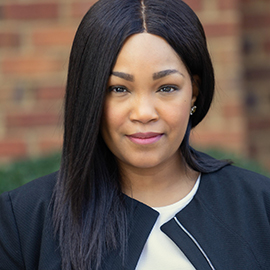 Yanique Woodall is Chair of the IPR Board of Trustees and Vice President of Communications at CVS Health.
...
Yanique Woodall is Chair of the IPR Board of Trustees and Vice President of Communications at CVS Health.
... 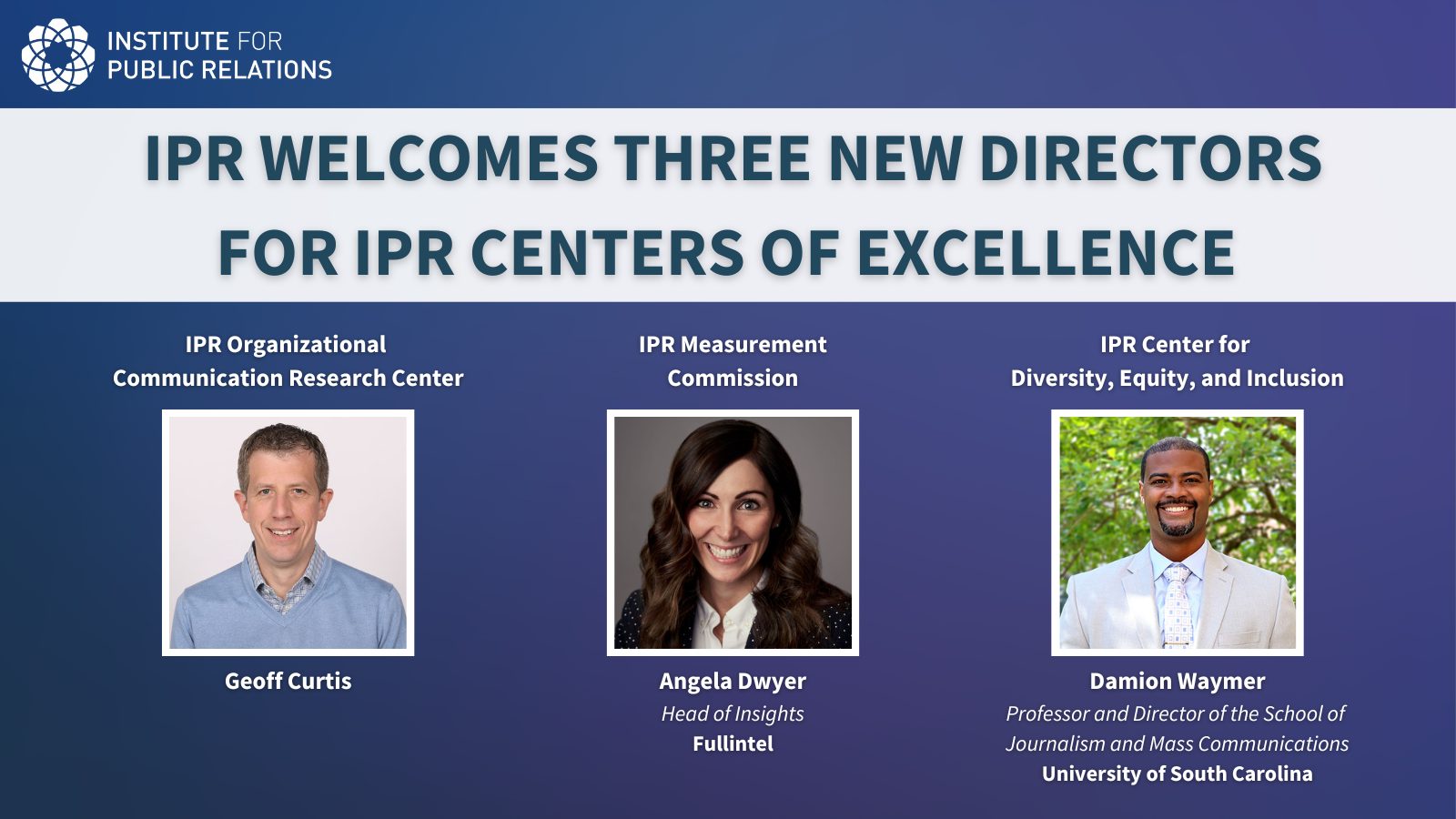
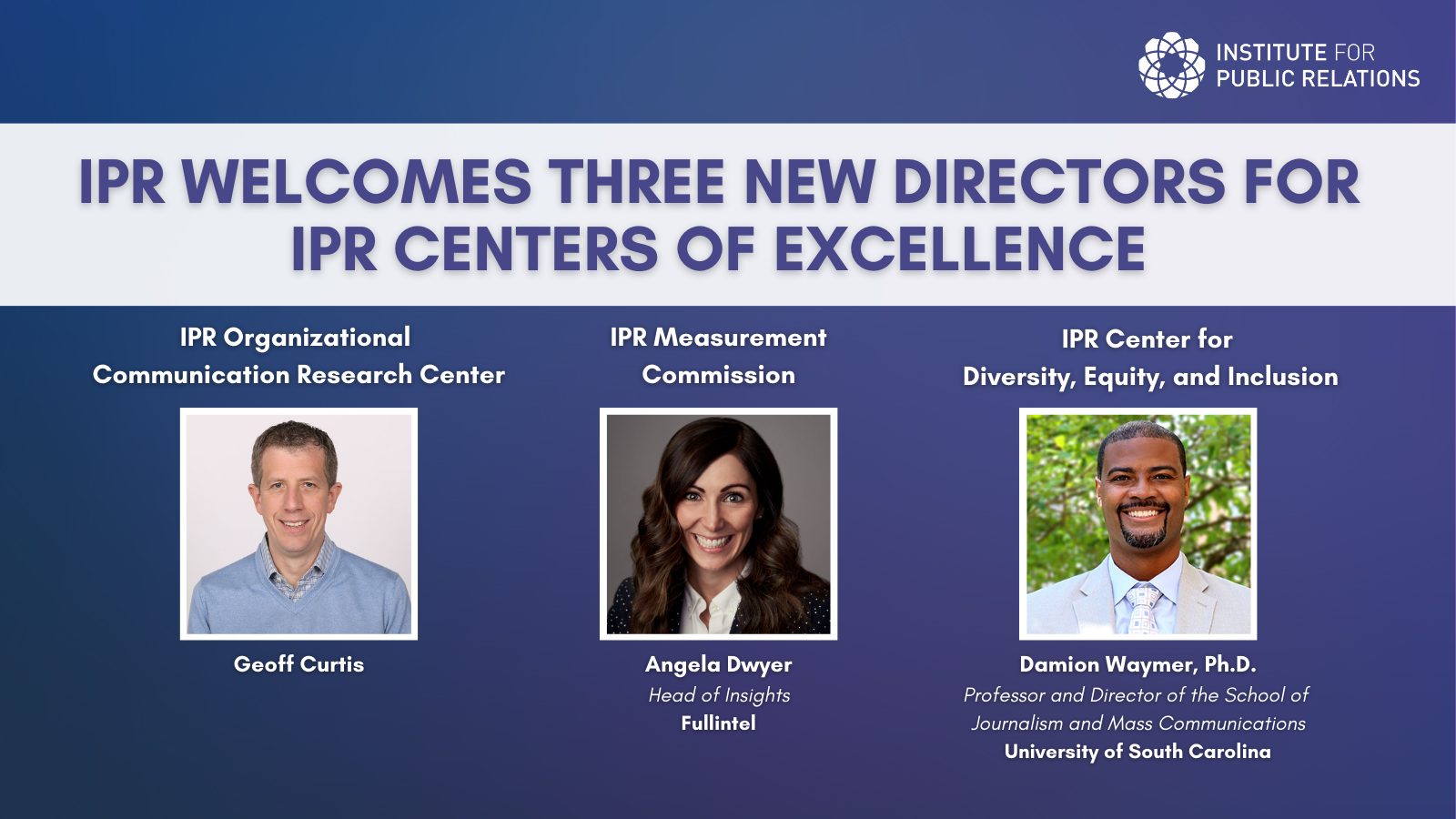 Gainesville, Fla. – The Institute for Public Relations (IPR) Board of Trustees has elected three new Directors for the IPR Commissions and Centers of Excellence. The Directors help guide the mission, research, and strategy of each of these centers based on critically important long-term areas of interest determined by Trustees.“We are thrilled with the election of these new directors to our esteemed Centers for Excellence,” said IPR President and CEO, Tina McCorkindale, Ph.D., APR. “We are confident that they will steer the Centers toward innovative research and growth.”The three new directors are:IPR Organizational Communication Research Center (OCRC)– Geoff Curtis, IPR TrusteeIPR Measurement Commission– Angela Dwyer, Head of Insights at FullintelIPR Center for Diversity, Equity, and Inclusion (CDEI)– Damion Waymer, Ph.D., Professor and Director at the University of South Carolina School of Journalism and Mass Communications
Geoff Curtis – IPR Organization Communication Research Center Geoff Curtis is director of the IPR Organizational Communication Research Center beginning in 2024. Curtis succeeds Ethan McCarty, previous director of the Organizational Communication Research Center. Geoff Curtis was most recently Executive Vice President of Corporate Affairs and Chief Communications Officer at Horizon Therapeutics. He joined Horizon Therapeutics in 2015 and has more than two decades of global healthcare communications experience.Prior to joining Horizon Therapeutics, Geoff served as senior vice president at Edelman Public Relations and as part of its National Health Media Team he led media strategy and execution for a large portfolio of pharmaceutical, biotech, and medical device clients. Previously, Geoff was group director of the media practice at WCG, a W20 Group company, where he provided product and corporate communications counsel and handled ongoing media relations for a broad range of healthcare clients. Before WCG, he held a similar role at GCI Group.Prior to joining GCI, Geoff served as a public affairs manager in the Pharmaceutical Products Division at Abbott (now AbbVie), where he led internal and external communications programs for the immunology, neuroscience, and oncology franchises.
Angela Dwyer – IPR Measurement CommissionAngela Dwyer is director of the Measurement Commission beginning in 2024. Dwyer succeeds Dr. Julie O’Neil, who previously served as director of the Commission.Dwyer is Head of Insights at Fullintel. She helps brands improve business results through data-driven, actionable insights. She has worked at public relations agencies and media research firms consulting with brands across several industries including consumer, healthcare and automotive. She has presented and published several original, award-winning research papers on varied topics including news content that drives recall and engagement, the measured value of public relations and factors that increase trust.Prior to her role at Fullintel, Dwyer was SVP of Measurement at Lippe Taylor, a NYC-based agency, where she developed a research-based metric to predict positive recall. Previously, she opened and managed PRIME Research’s new business and operations in Brazil and South America, where she worked with global brands on integrated media measurement projects.Her contribution to the field has been celebrated with several industry awards. She has been recognized with a PRNEWS People of the Year Award as a Data & Measurement Game Changer, a PRNEWS Top Women Award in the Industry Champions Category, and an AMEC Rising Star recognition as an innovator in communication measurement.
Damion Waymer, Ph.D. – IPR Center of Diversity, Equity, and InclusionDr. Damion Wayner is director of the IPR Center for Diversity, Equity, and Inclusion beginning in 2024. Dr. Waymer succeeds Emily Graham and Dr. Natalie Tindall, who previously served as co-directors of the Center. Damion Waymer, a native of Orangeburg, SC, is the Director of the School of Journalism and Mass Communications at the University of South Carolina. Prior to this appointment, he held varied administrative roles including the Senior Associate Dean of the College of Communication & Information Sciences as well as the Department Chair of Advertising & Public Relations at The University of Alabama.Previously, Dr. Waymer led aggressive faculty recruitment and retention initiatives in his role as Associate Provost for Faculty Affairs, Development & Diversity at the University of Cincinnati. He spearheaded new faculty development opportunities, and he created annual university-level awards such as the Provost Exemplary Department Award where top departments were recognized for their excellence in a pre-determined area. Dr. Waymer is a seasoned communication researcher and practitioner who has conducted respected research in the contexts of public relations, crisis communication, corporate social responsibility (CSR), branding, and strategic communication. He has held faculty appointments at leading research institutions such as Virginia Tech, University of Cincinnati, and Texas A&M University.
About the Institute for Public RelationsFounded in 1956, the Institute for Public Relations is an independent, nonprofit foundation dedicated to the science beneath the art of public relations™. IPR creates, curates, and promotes research and initiatives that empower professionals with actionable insights and intelligence they can put to immediate use. IPR predicts and analyzes global factors transforming the profession and amplifies and engages the professional globally through thought leadership and programming. All research is available free at www.instituteforpr.org and provides the basis for IPR’s professional conferences and events.
...
Gainesville, Fla. – The Institute for Public Relations (IPR) Board of Trustees has elected three new Directors for the IPR Commissions and Centers of Excellence. The Directors help guide the mission, research, and strategy of each of these centers based on critically important long-term areas of interest determined by Trustees.“We are thrilled with the election of these new directors to our esteemed Centers for Excellence,” said IPR President and CEO, Tina McCorkindale, Ph.D., APR. “We are confident that they will steer the Centers toward innovative research and growth.”The three new directors are:IPR Organizational Communication Research Center (OCRC)– Geoff Curtis, IPR TrusteeIPR Measurement Commission– Angela Dwyer, Head of Insights at FullintelIPR Center for Diversity, Equity, and Inclusion (CDEI)– Damion Waymer, Ph.D., Professor and Director at the University of South Carolina School of Journalism and Mass Communications
Geoff Curtis – IPR Organization Communication Research Center Geoff Curtis is director of the IPR Organizational Communication Research Center beginning in 2024. Curtis succeeds Ethan McCarty, previous director of the Organizational Communication Research Center. Geoff Curtis was most recently Executive Vice President of Corporate Affairs and Chief Communications Officer at Horizon Therapeutics. He joined Horizon Therapeutics in 2015 and has more than two decades of global healthcare communications experience.Prior to joining Horizon Therapeutics, Geoff served as senior vice president at Edelman Public Relations and as part of its National Health Media Team he led media strategy and execution for a large portfolio of pharmaceutical, biotech, and medical device clients. Previously, Geoff was group director of the media practice at WCG, a W20 Group company, where he provided product and corporate communications counsel and handled ongoing media relations for a broad range of healthcare clients. Before WCG, he held a similar role at GCI Group.Prior to joining GCI, Geoff served as a public affairs manager in the Pharmaceutical Products Division at Abbott (now AbbVie), where he led internal and external communications programs for the immunology, neuroscience, and oncology franchises.
Angela Dwyer – IPR Measurement CommissionAngela Dwyer is director of the Measurement Commission beginning in 2024. Dwyer succeeds Dr. Julie O’Neil, who previously served as director of the Commission.Dwyer is Head of Insights at Fullintel. She helps brands improve business results through data-driven, actionable insights. She has worked at public relations agencies and media research firms consulting with brands across several industries including consumer, healthcare and automotive. She has presented and published several original, award-winning research papers on varied topics including news content that drives recall and engagement, the measured value of public relations and factors that increase trust.Prior to her role at Fullintel, Dwyer was SVP of Measurement at Lippe Taylor, a NYC-based agency, where she developed a research-based metric to predict positive recall. Previously, she opened and managed PRIME Research’s new business and operations in Brazil and South America, where she worked with global brands on integrated media measurement projects.Her contribution to the field has been celebrated with several industry awards. She has been recognized with a PRNEWS People of the Year Award as a Data & Measurement Game Changer, a PRNEWS Top Women Award in the Industry Champions Category, and an AMEC Rising Star recognition as an innovator in communication measurement.
Damion Waymer, Ph.D. – IPR Center of Diversity, Equity, and InclusionDr. Damion Wayner is director of the IPR Center for Diversity, Equity, and Inclusion beginning in 2024. Dr. Waymer succeeds Emily Graham and Dr. Natalie Tindall, who previously served as co-directors of the Center. Damion Waymer, a native of Orangeburg, SC, is the Director of the School of Journalism and Mass Communications at the University of South Carolina. Prior to this appointment, he held varied administrative roles including the Senior Associate Dean of the College of Communication & Information Sciences as well as the Department Chair of Advertising & Public Relations at The University of Alabama.Previously, Dr. Waymer led aggressive faculty recruitment and retention initiatives in his role as Associate Provost for Faculty Affairs, Development & Diversity at the University of Cincinnati. He spearheaded new faculty development opportunities, and he created annual university-level awards such as the Provost Exemplary Department Award where top departments were recognized for their excellence in a pre-determined area. Dr. Waymer is a seasoned communication researcher and practitioner who has conducted respected research in the contexts of public relations, crisis communication, corporate social responsibility (CSR), branding, and strategic communication. He has held faculty appointments at leading research institutions such as Virginia Tech, University of Cincinnati, and Texas A&M University.
About the Institute for Public RelationsFounded in 1956, the Institute for Public Relations is an independent, nonprofit foundation dedicated to the science beneath the art of public relations™. IPR creates, curates, and promotes research and initiatives that empower professionals with actionable insights and intelligence they can put to immediate use. IPR predicts and analyzes global factors transforming the profession and amplifies and engages the professional globally through thought leadership and programming. All research is available free at www.instituteforpr.org and provides the basis for IPR’s professional conferences and events.
... 
 As the world becomes increasingly polarized and experiences turmoil, scholars have envisioned different ways that public relations can contribute to the common good. For example, Shen and Jiang (2021) renewed the call for a community approach to public relations, echoing the proposition by Kruckeberg and Starck (1988) that public relations should be about restoring and maintaining a sense of community. On the other hand, recent research (Ni & Shen, 2023; Shen & Northup, 2023) on different groups of publics highlighted the importance of people’s identity, particularly their identity salience, in influencing their perceptions, motivations, and even behaviors. In this post, I discuss the concept of identity strength and identity salience and their implications to internal community development.The internal community approach posits that organizations can build and sustain internal communities and reimagine the workplace as a space for co-creation, solidarity, diversity, and inclusion. The development and growth of such internal communities largely depend on members’ individual agency. Contributing factors to individual agency include the strength and salience of one’s identity. In the context of internal public relations, identity strength refers to internal community members’ (e.g., employees) extent of identification with an organization as part of their total sense of self. In contrast, identity salience explains the relative importance of these members’ identification to their sense of self.Research on identity in public relations has primarily focused on types of identity and their intersectionality, not identity salience. Ni and Shen (2023) first examined the role of political identity salience in affecting people’s communication behavior regarding COVID-19. They conducted an online survey with 556 adults that reflected the diverse racial makeup of a large city in Southern US. Their findings revealed that individuals with a highly salient political identity tended to exhibit reduced constraint recognition, indicating that the more salient one’s political identity, the more likely they were to believe they could personally address the issue of COVID-19. Furthermore, the study demonstrated that political identity salience was positively associated with increased problem recognition. In other words, those individuals with a strong political identity were more inclined to recognize COVID-19 as a substantial problem requiring immediate attention and action. Additionally, individuals with a highly salient political identity were found to engage more actively in the forwarding of information about COVID-19. This suggests that it was the most dedicated members from various political groups, irrespective of party affiliations, who were actively involved in disseminating information about COVID-19, potentially contributing to the heightened politicization of the issue. In another study of alumni publics, Shen and Northup (2023) concluded that alumni’s identity with an academic unit, i.e., identity strength, as well as their identity salience could enhance their agency. These empowered alumni agents also displayed higher levels of engagement with the academic unit, including being involved in their events, guest lecturing and mentoring activities, and feeling enthusiastic about the organization.Implications for Internal CommunicationExtending these research findings to internal communication, public relations practitioners can facilitate institutional and individual community members to co-create and re-create rules of communication and dialogue. When community is fostered in the process, members’ identity strength and salience could rise, which then activates their individual agency. Empowered internal agents could at the same time become more engaged and involved in the internal communities. They may also contribute to more information flow in and out of their internal communities, such as conducting more positive megaphoning of their organizations.
As the world becomes increasingly polarized and experiences turmoil, scholars have envisioned different ways that public relations can contribute to the common good. For example, Shen and Jiang (2021) renewed the call for a community approach to public relations, echoing the proposition by Kruckeberg and Starck (1988) that public relations should be about restoring and maintaining a sense of community. On the other hand, recent research (Ni & Shen, 2023; Shen & Northup, 2023) on different groups of publics highlighted the importance of people’s identity, particularly their identity salience, in influencing their perceptions, motivations, and even behaviors. In this post, I discuss the concept of identity strength and identity salience and their implications to internal community development.The internal community approach posits that organizations can build and sustain internal communities and reimagine the workplace as a space for co-creation, solidarity, diversity, and inclusion. The development and growth of such internal communities largely depend on members’ individual agency. Contributing factors to individual agency include the strength and salience of one’s identity. In the context of internal public relations, identity strength refers to internal community members’ (e.g., employees) extent of identification with an organization as part of their total sense of self. In contrast, identity salience explains the relative importance of these members’ identification to their sense of self.Research on identity in public relations has primarily focused on types of identity and their intersectionality, not identity salience. Ni and Shen (2023) first examined the role of political identity salience in affecting people’s communication behavior regarding COVID-19. They conducted an online survey with 556 adults that reflected the diverse racial makeup of a large city in Southern US. Their findings revealed that individuals with a highly salient political identity tended to exhibit reduced constraint recognition, indicating that the more salient one’s political identity, the more likely they were to believe they could personally address the issue of COVID-19. Furthermore, the study demonstrated that political identity salience was positively associated with increased problem recognition. In other words, those individuals with a strong political identity were more inclined to recognize COVID-19 as a substantial problem requiring immediate attention and action. Additionally, individuals with a highly salient political identity were found to engage more actively in the forwarding of information about COVID-19. This suggests that it was the most dedicated members from various political groups, irrespective of party affiliations, who were actively involved in disseminating information about COVID-19, potentially contributing to the heightened politicization of the issue. In another study of alumni publics, Shen and Northup (2023) concluded that alumni’s identity with an academic unit, i.e., identity strength, as well as their identity salience could enhance their agency. These empowered alumni agents also displayed higher levels of engagement with the academic unit, including being involved in their events, guest lecturing and mentoring activities, and feeling enthusiastic about the organization.Implications for Internal CommunicationExtending these research findings to internal communication, public relations practitioners can facilitate institutional and individual community members to co-create and re-create rules of communication and dialogue. When community is fostered in the process, members’ identity strength and salience could rise, which then activates their individual agency. Empowered internal agents could at the same time become more engaged and involved in the internal communities. They may also contribute to more information flow in and out of their internal communities, such as conducting more positive megaphoning of their organizations.
 Hongmei Shen, Ph.D., APR, is a professor in public relations at the School of Journalism & Media Studies, San Diego State University.
...
Hongmei Shen, Ph.D., APR, is a professor in public relations at the School of Journalism & Media Studies, San Diego State University.
... 
 This summary is provided by the IPR Digital Media Research CenterMuck Rack examined AI use among public relations professionals in 2023.A survey of 1,001 public relations professionals was conducted Nov. 2 – Dec. 14, 2023.Key findings include:— The number of PR professionals who said they use generative AI increased from 28% in March 2023 to 64% in November 2023. — 21% of PR professionals at agencies said they never disclose their AI use to clients, compared to 6% of PR professionals who work for a single brand.— 74% of PR pros report an increase in the quality of their work using AI and 89% say they complete projects more quickly with AI. — Generative AI is mostly used for writing social copy (64%), research (58%), writing press releases (58%), and crafting pitches (54%).Check out how public relations professionals are using AI in their workflow
...
This summary is provided by the IPR Digital Media Research CenterMuck Rack examined AI use among public relations professionals in 2023.A survey of 1,001 public relations professionals was conducted Nov. 2 – Dec. 14, 2023.Key findings include:— The number of PR professionals who said they use generative AI increased from 28% in March 2023 to 64% in November 2023. — 21% of PR professionals at agencies said they never disclose their AI use to clients, compared to 6% of PR professionals who work for a single brand.— 74% of PR pros report an increase in the quality of their work using AI and 89% say they complete projects more quickly with AI. — Generative AI is mostly used for writing social copy (64%), research (58%), writing press releases (58%), and crafting pitches (54%).Check out how public relations professionals are using AI in their workflow
... 
 This summary is provided by the IPR ESG & Purpose Research LibraryThe Potential Energy Coalition examined global perspectives on climate change action and best messaging practices.An online survey of 57,968 respondents was conducted June 12 – August 28, 2023 across 23 countries with over 2,000 respondents per country.Key findings include:— 71% of total respondents on average agreed with the statement “I support immediate action by the government to address climate change,” compared to 13% of respondents who disagreed with that statement. — The largest gap in support by political leaning was in the U.S. (46 percentage points), followed by Australia (30 percentage points), and Brazil (25 percentage points). — Messages that resonated most with respondents focused on urgency and generational aspects, such as “Later is too late because it’s putting our children’s futures at risk.”— Other messaging themes that resonated most with respondents include: —- Messaging that concentrates on holding larger polluters accountable.—- Motivating messages about optimistic realities, i.e., the portion of energy already coming from clean sources.Learn how different climate messaging tactics are perceived across the globe
...
This summary is provided by the IPR ESG & Purpose Research LibraryThe Potential Energy Coalition examined global perspectives on climate change action and best messaging practices.An online survey of 57,968 respondents was conducted June 12 – August 28, 2023 across 23 countries with over 2,000 respondents per country.Key findings include:— 71% of total respondents on average agreed with the statement “I support immediate action by the government to address climate change,” compared to 13% of respondents who disagreed with that statement. — The largest gap in support by political leaning was in the U.S. (46 percentage points), followed by Australia (30 percentage points), and Brazil (25 percentage points). — Messages that resonated most with respondents focused on urgency and generational aspects, such as “Later is too late because it’s putting our children’s futures at risk.”— Other messaging themes that resonated most with respondents include: —- Messaging that concentrates on holding larger polluters accountable.—- Motivating messages about optimistic realities, i.e., the portion of energy already coming from clean sources.Learn how different climate messaging tactics are perceived across the globe
... 
 This blog is provided by the IPR Digital Media Research CenterWhen should artificial intelligence (AI) use be disclosed? Recently the journalism world was rocked when Sports Illustrated, once heralded as one of the best examples of journalistic excellence, was revealed to have published articles and product reviews written by AI while passing them off as human-created content. The public and industry backlash against the magazine’s dishonest and deceptive practices demonstrates the importance of ethics in AI use and how poor decisions in content production can lead to long term consequences. The ethical issues surrounding artificial intelligence are not totally new. They are rooted in longstanding questions about transparency, trust, and the fears of technology itself. There is a palpable concern in the public relations industry that AI will eliminate jobs, or, at the very best, radically transform them. There is also a sense of professional uncertainty around use itself. When is it appropriate to generate content using AI? What are the consequences of using AI for activities such as brainstorming, editing, or fact-checking? How do practitioners ensure that information generated on AI platforms is accurate? What should clients and readers know about how the content is made? Is there a threshold for disclosure? Is disclosure even necessary as AI use becomes an industry norm?In public relations practice, transparent communication is an ethical mantra that has been around for decades. Transparency literature certainly advocates for all sorts of disclosures. However, practical issues make the application of transparency sometimes easier to talk about than implement. For instance, does a PR practitioner have to disclose AI use that was used for brainstorming? What if the AI platform was used for editing content? What if AI was tangentially used to get background information? It is determining when that appropriateness threshold is met that creates an area of debate for the PR profession. As a field, we have yet to create a definitive answer.The Argument for DisclosureDisclosure is frequently identified as a best practice because people ought to know who is writing and creating content. It reveals bias, honesty, and upholds the tenets of transparency. In a field that values authentic communication, purely AI-created content loses the humanity that good communicators provide. Like the byline in an article or content information in a press release, disclosure of AI use provides a level of accountability for the PR practitioner or firm. As disinformation becomes a continuing issue in communication, disclosure of AI use also positions public relations practitioners as good faith actors in combatting fake news. It shows that the field values its audiences, clients, and society, and honors their trust in public relations as a profession. Disclosure of AI use also provides a starting point for client conversations. Some clients may not want their work completed using AI for a variety of legitimate reasons. Generative AI systems operate on a continuum of openness. Clients, particularly in healthcare, may not want their proprietary information used on a platform that could cause disclosure of private and proprietary information. Generative AI use in healthcare communication provide unique issues, particularly in a field that has detailed privacy regulations such as HIPPA. Clients may also be reluctant to accept AI-generated work, considering the intellectual property issues that it could pose, including innocent copyright infringement and the lack of copyright protection given to purely AI-generated work. Disclosure helps the audience, clients, and practitioners know where they stand regarding content creation. It facilitates discussions while also maintaining the ethical transparency expected of the field.The Argument *Against* DisclosureThis heading appears with asterisks because almost no one argues that AI use should never be disclosed. The nefarious use of AI to create deceptive and misleading content is never acceptable. No professional public relations practitioner would ever argue for such a position publicly. However, there are questions about when revealing AI use is necessary, especially in situations where the use is tangential or minimal in comparison to the content created. Consider the following examples:— A PR practitioner writes a news announcement for a client and then runs that announcement through ChatGPT to determine if there are logical inconsistencies in the piece. — A PR firm working on a new PR campaign brainstorms using generative AI ideas about logo creation and infographics but does not use the actual produced work product. — A designer uses AI to edit a photograph to enhance the colors and slightly edit the photo for clarity. All these examples present scenarios about the degree of which AI use warrants disclosure. There is a difference between using AI to build complex content with proprietary information and using AI to brainstorm potential campaign ideas. Afterall, there are many tools used in the PR practitioner’s daily work such as spell check, photo editing software, and the internet that aren’t disclosed because its use is assumed. Perhaps these scenarios raised more questions than answers, but it is something PR practitioners and the industry writ large will have to grapple with.Will the Law Require Disclosure? Much of the contemporary conversations around AI have been rooted in fear of its power. AI is a tool that can facilitate deception, discrimination, defamation, and infringement at a faster rate than before. Deception is particularly troublesome because the ease of AI creates a lowered barrier to entry – anyone with a smart phone or computer and a free subscription can produce a lot of bad content. Because of this, the government has entered the discussion on AI disclosure. For example, AI is regularly used in hiring decisions. Currently New York City, Maryland, and Illinois have laws that mandate the disclosure of AI use in employment screening processes. NYC’s law requires annual bias audits for the AI system. [i] Illinois’ law regulates the use of AI in job interviews where the AI platform evaluates facial expressions and answers to score the job candidate.[ii] Maryland’s law, passed in 2020, mandates that employers seek permission to cross-check applicant’s faces against facial recognition databases.[iii] At the federal level, the Algorithmic Accountability Act of 2023, is an attempt by Congress to address some of the same issues addressed by states and cities. While not law, it signals a direction in how lawmakers view the excesses of AI use in job decisions, and how there is a concern about the privacy and discrimination applicants may face in a truly AI-driven process. Lawmakers are also concerned about AI platforms disclosing when content is AI-generated. There is currently a bipartisan bill in the U.S. Senate called the AI Labelling Act,[iv] which would require disclosure of AI chatbots and content. There is a House version of this bill as well. If passed, it would require AI platforms to label its outputs with disclosures that they are AI-generated. The disclosures would be embedded in the metadata of the content. However, industry is also addressing when to disclose certain content. For example, Google, and later Meta, require disclosures for all AI-generated political ads in 2024. The requirement is global, and Meta’s policy specifically mandates disclosure when AI is used to create synthetic people or events. Similarly, YouTube is requiring disclosures and content labels of AI content for realistic videos. Their blog post announcing the new policy specifically mentioned that AI-generated content disclosure is particularly important for “sensitive topics,” such as elections, public health, and conflict.The 2024 U.S. presidential election also raises concerns about disinformation generated from AI. However, this is a global problem. In October 2023 the impact of disinformation created by AI was on full display in Slovakia where Michal Šimečka, a political candidate, was shown on Facebook making comments about rigging the election. The image and voice were AI-generated deepfakes published within 48 hours of the election when Slovakian law mandates a quiet period by candidates and the press. Because the timing of the deepfake was within 48 hours of the polls opening, combatting the disinformation was extremely difficult and demonstrated the type of crisis disinformation can produce within the democratic process. In the U.S., the Federal Election Commission (FEC) recognizes the problem of AI, specifically deepfakes, within political campaigns. However, concrete legislation on combatting deepfakes is still under development federally, and only three states, Washington, Minnesota, and Michigan, have laws that directly address the use of AI in elections. These laws vary in their approach to AI use in campaign content. Washington requires a disclosure of AI use, while Minnesota mandates a ban on deepfakes within 90 days of the election.[v] Michigan requires a ban of “materially deceptive media” 90 days before an election, and mandates disclosure of media “manipulated by technical means.”[vi] The effectiveness of these laws and potential federal regulation remain to be seen. AI and deepfake technology’s insidious impact likely materialize in 2024 globally because the actors involved in creating this information will not likely operate within the boundaries of any law.So… Should PR Practitioners Disclose AI Use?The answer likely depends on content, but overall, it is best to disclose when in doubt. Disclosure is an issue of integrity for the PR profession and its work. As the Sports Illustrated example shows, failing to disclose opens organizations and practitioners up to severe criticism. PR practitioners should welcome the opportunity that this technological issue provides. Given the protracted partisanship in Washington, D.C., and the slowness of federal agency regulation, it is likely the public relations industry, and not the government, that will decide the practice of AI disclosure. PR practitioners are well positioned to comply with these types of disclosures given their expertise in digital communication and the ethical awareness the field has for transparency and trust.Disclosure presents an opportunity for public relations practice to positively lead in the era of disinformation through commitments to transparency. It is important to note that laws provide a baseline for behavior, not a ceiling. Proper disclosure of AI use provides for a heightened standard for the industry and profession. It seems that even ChatGPT agrees. When prompted with “should PR practitioners disclose their use of AI-generated content” it replied, “Overall, disclosure of AI use in PR is not only a best practice for maintaining ethical standards and trust but also important for navigating the evolving landscape of digital communication and AI technology.”[vii][i] “Local Law 144 of 2021: Automated Employment Decision Tools (AEDT),” New York City, 2021. Accessed from https://www.nyc.gov/site/dca/about/automated-employment-decision-tools.page.[ii] Illinois General Assembly. “Artificial Intelligence Video Interview Act.” 820 ILCS 42. Accessed December 5, 2023. https://www.ilga.gov/legislation/ilcs/ilcs3.asp?ActID=4015&ChapterID=68.[iii] “Labor and Employment – Use of Facial Recognition Services – Prohibition,” sponsored by Delegates M. Fisher, Adams, Arentz, D.E. Davis, Howard, Miller, and Qi, enacted under Article II, Section 17(c) of the Maryland Constitution, Chapter 446, 2020.[iv] United States Congress. (2023). [Bill Number: S.2691 – 118th Congress]. Retrieved December 20, 2023, from https://www.congress.gov/118/bills/s2691/BILLS-118s2691is.xml.[v] SB 5152, Section 1, [604.32], 2023-24 Session, Cause of Action for Nonconsensual Dissemination of a Deep Fake Depicting Intimate Parts or Sexual Acts; SB 5152, 2023-24 Session, Defining Synthetic Media in Campaigns for Elective Office, and Providing Relief for Candidates and Campaigns.[vi] Public Acts of 2023, Act No. 265, Michigan Legislature, 102nd Legislature, Regular Session (Approved November 30, 2023; Filed December 1, 2023; Effective February 13, 2024).[vii] ChatGPT. “Should PR Practitioners Disclose Their Use of AI-generated Content?” OpenAI ChatGPT, December 5, 2023.
This blog is provided by the IPR Digital Media Research CenterWhen should artificial intelligence (AI) use be disclosed? Recently the journalism world was rocked when Sports Illustrated, once heralded as one of the best examples of journalistic excellence, was revealed to have published articles and product reviews written by AI while passing them off as human-created content. The public and industry backlash against the magazine’s dishonest and deceptive practices demonstrates the importance of ethics in AI use and how poor decisions in content production can lead to long term consequences. The ethical issues surrounding artificial intelligence are not totally new. They are rooted in longstanding questions about transparency, trust, and the fears of technology itself. There is a palpable concern in the public relations industry that AI will eliminate jobs, or, at the very best, radically transform them. There is also a sense of professional uncertainty around use itself. When is it appropriate to generate content using AI? What are the consequences of using AI for activities such as brainstorming, editing, or fact-checking? How do practitioners ensure that information generated on AI platforms is accurate? What should clients and readers know about how the content is made? Is there a threshold for disclosure? Is disclosure even necessary as AI use becomes an industry norm?In public relations practice, transparent communication is an ethical mantra that has been around for decades. Transparency literature certainly advocates for all sorts of disclosures. However, practical issues make the application of transparency sometimes easier to talk about than implement. For instance, does a PR practitioner have to disclose AI use that was used for brainstorming? What if the AI platform was used for editing content? What if AI was tangentially used to get background information? It is determining when that appropriateness threshold is met that creates an area of debate for the PR profession. As a field, we have yet to create a definitive answer.The Argument for DisclosureDisclosure is frequently identified as a best practice because people ought to know who is writing and creating content. It reveals bias, honesty, and upholds the tenets of transparency. In a field that values authentic communication, purely AI-created content loses the humanity that good communicators provide. Like the byline in an article or content information in a press release, disclosure of AI use provides a level of accountability for the PR practitioner or firm. As disinformation becomes a continuing issue in communication, disclosure of AI use also positions public relations practitioners as good faith actors in combatting fake news. It shows that the field values its audiences, clients, and society, and honors their trust in public relations as a profession. Disclosure of AI use also provides a starting point for client conversations. Some clients may not want their work completed using AI for a variety of legitimate reasons. Generative AI systems operate on a continuum of openness. Clients, particularly in healthcare, may not want their proprietary information used on a platform that could cause disclosure of private and proprietary information. Generative AI use in healthcare communication provide unique issues, particularly in a field that has detailed privacy regulations such as HIPPA. Clients may also be reluctant to accept AI-generated work, considering the intellectual property issues that it could pose, including innocent copyright infringement and the lack of copyright protection given to purely AI-generated work. Disclosure helps the audience, clients, and practitioners know where they stand regarding content creation. It facilitates discussions while also maintaining the ethical transparency expected of the field.The Argument *Against* DisclosureThis heading appears with asterisks because almost no one argues that AI use should never be disclosed. The nefarious use of AI to create deceptive and misleading content is never acceptable. No professional public relations practitioner would ever argue for such a position publicly. However, there are questions about when revealing AI use is necessary, especially in situations where the use is tangential or minimal in comparison to the content created. Consider the following examples:— A PR practitioner writes a news announcement for a client and then runs that announcement through ChatGPT to determine if there are logical inconsistencies in the piece. — A PR firm working on a new PR campaign brainstorms using generative AI ideas about logo creation and infographics but does not use the actual produced work product. — A designer uses AI to edit a photograph to enhance the colors and slightly edit the photo for clarity. All these examples present scenarios about the degree of which AI use warrants disclosure. There is a difference between using AI to build complex content with proprietary information and using AI to brainstorm potential campaign ideas. Afterall, there are many tools used in the PR practitioner’s daily work such as spell check, photo editing software, and the internet that aren’t disclosed because its use is assumed. Perhaps these scenarios raised more questions than answers, but it is something PR practitioners and the industry writ large will have to grapple with.Will the Law Require Disclosure? Much of the contemporary conversations around AI have been rooted in fear of its power. AI is a tool that can facilitate deception, discrimination, defamation, and infringement at a faster rate than before. Deception is particularly troublesome because the ease of AI creates a lowered barrier to entry – anyone with a smart phone or computer and a free subscription can produce a lot of bad content. Because of this, the government has entered the discussion on AI disclosure. For example, AI is regularly used in hiring decisions. Currently New York City, Maryland, and Illinois have laws that mandate the disclosure of AI use in employment screening processes. NYC’s law requires annual bias audits for the AI system. [i] Illinois’ law regulates the use of AI in job interviews where the AI platform evaluates facial expressions and answers to score the job candidate.[ii] Maryland’s law, passed in 2020, mandates that employers seek permission to cross-check applicant’s faces against facial recognition databases.[iii] At the federal level, the Algorithmic Accountability Act of 2023, is an attempt by Congress to address some of the same issues addressed by states and cities. While not law, it signals a direction in how lawmakers view the excesses of AI use in job decisions, and how there is a concern about the privacy and discrimination applicants may face in a truly AI-driven process. Lawmakers are also concerned about AI platforms disclosing when content is AI-generated. There is currently a bipartisan bill in the U.S. Senate called the AI Labelling Act,[iv] which would require disclosure of AI chatbots and content. There is a House version of this bill as well. If passed, it would require AI platforms to label its outputs with disclosures that they are AI-generated. The disclosures would be embedded in the metadata of the content. However, industry is also addressing when to disclose certain content. For example, Google, and later Meta, require disclosures for all AI-generated political ads in 2024. The requirement is global, and Meta’s policy specifically mandates disclosure when AI is used to create synthetic people or events. Similarly, YouTube is requiring disclosures and content labels of AI content for realistic videos. Their blog post announcing the new policy specifically mentioned that AI-generated content disclosure is particularly important for “sensitive topics,” such as elections, public health, and conflict.The 2024 U.S. presidential election also raises concerns about disinformation generated from AI. However, this is a global problem. In October 2023 the impact of disinformation created by AI was on full display in Slovakia where Michal Šimečka, a political candidate, was shown on Facebook making comments about rigging the election. The image and voice were AI-generated deepfakes published within 48 hours of the election when Slovakian law mandates a quiet period by candidates and the press. Because the timing of the deepfake was within 48 hours of the polls opening, combatting the disinformation was extremely difficult and demonstrated the type of crisis disinformation can produce within the democratic process. In the U.S., the Federal Election Commission (FEC) recognizes the problem of AI, specifically deepfakes, within political campaigns. However, concrete legislation on combatting deepfakes is still under development federally, and only three states, Washington, Minnesota, and Michigan, have laws that directly address the use of AI in elections. These laws vary in their approach to AI use in campaign content. Washington requires a disclosure of AI use, while Minnesota mandates a ban on deepfakes within 90 days of the election.[v] Michigan requires a ban of “materially deceptive media” 90 days before an election, and mandates disclosure of media “manipulated by technical means.”[vi] The effectiveness of these laws and potential federal regulation remain to be seen. AI and deepfake technology’s insidious impact likely materialize in 2024 globally because the actors involved in creating this information will not likely operate within the boundaries of any law.So… Should PR Practitioners Disclose AI Use?The answer likely depends on content, but overall, it is best to disclose when in doubt. Disclosure is an issue of integrity for the PR profession and its work. As the Sports Illustrated example shows, failing to disclose opens organizations and practitioners up to severe criticism. PR practitioners should welcome the opportunity that this technological issue provides. Given the protracted partisanship in Washington, D.C., and the slowness of federal agency regulation, it is likely the public relations industry, and not the government, that will decide the practice of AI disclosure. PR practitioners are well positioned to comply with these types of disclosures given their expertise in digital communication and the ethical awareness the field has for transparency and trust.Disclosure presents an opportunity for public relations practice to positively lead in the era of disinformation through commitments to transparency. It is important to note that laws provide a baseline for behavior, not a ceiling. Proper disclosure of AI use provides for a heightened standard for the industry and profession. It seems that even ChatGPT agrees. When prompted with “should PR practitioners disclose their use of AI-generated content” it replied, “Overall, disclosure of AI use in PR is not only a best practice for maintaining ethical standards and trust but also important for navigating the evolving landscape of digital communication and AI technology.”[vii][i] “Local Law 144 of 2021: Automated Employment Decision Tools (AEDT),” New York City, 2021. Accessed from https://www.nyc.gov/site/dca/about/automated-employment-decision-tools.page.[ii] Illinois General Assembly. “Artificial Intelligence Video Interview Act.” 820 ILCS 42. Accessed December 5, 2023. https://www.ilga.gov/legislation/ilcs/ilcs3.asp?ActID=4015&ChapterID=68.[iii] “Labor and Employment – Use of Facial Recognition Services – Prohibition,” sponsored by Delegates M. Fisher, Adams, Arentz, D.E. Davis, Howard, Miller, and Qi, enacted under Article II, Section 17(c) of the Maryland Constitution, Chapter 446, 2020.[iv] United States Congress. (2023). [Bill Number: S.2691 – 118th Congress]. Retrieved December 20, 2023, from https://www.congress.gov/118/bills/s2691/BILLS-118s2691is.xml.[v] SB 5152, Section 1, [604.32], 2023-24 Session, Cause of Action for Nonconsensual Dissemination of a Deep Fake Depicting Intimate Parts or Sexual Acts; SB 5152, 2023-24 Session, Defining Synthetic Media in Campaigns for Elective Office, and Providing Relief for Candidates and Campaigns.[vi] Public Acts of 2023, Act No. 265, Michigan Legislature, 102nd Legislature, Regular Session (Approved November 30, 2023; Filed December 1, 2023; Effective February 13, 2024).[vii] ChatGPT. “Should PR Practitioners Disclose Their Use of AI-generated Content?” OpenAI ChatGPT, December 5, 2023.
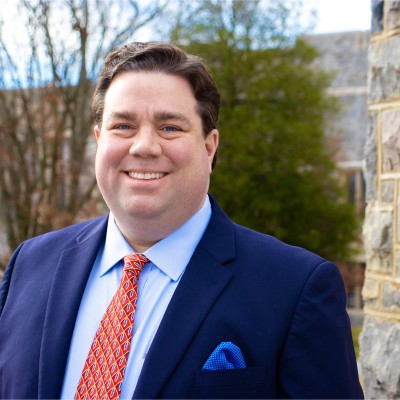 Cayce Myers, Ph.D., LL.M., J.D., APR is a professor and director of graduate studies at the Virginia Tech School of Communication. He is the Legal Research Editor for the Institute for Public Relations. He can be reached at mcmyers@vt.edu.In full disclosure, AI was not used in writing this piece except for the final quote.
...
Cayce Myers, Ph.D., LL.M., J.D., APR is a professor and director of graduate studies at the Virginia Tech School of Communication. He is the Legal Research Editor for the Institute for Public Relations. He can be reached at mcmyers@vt.edu.In full disclosure, AI was not used in writing this piece except for the final quote.
... 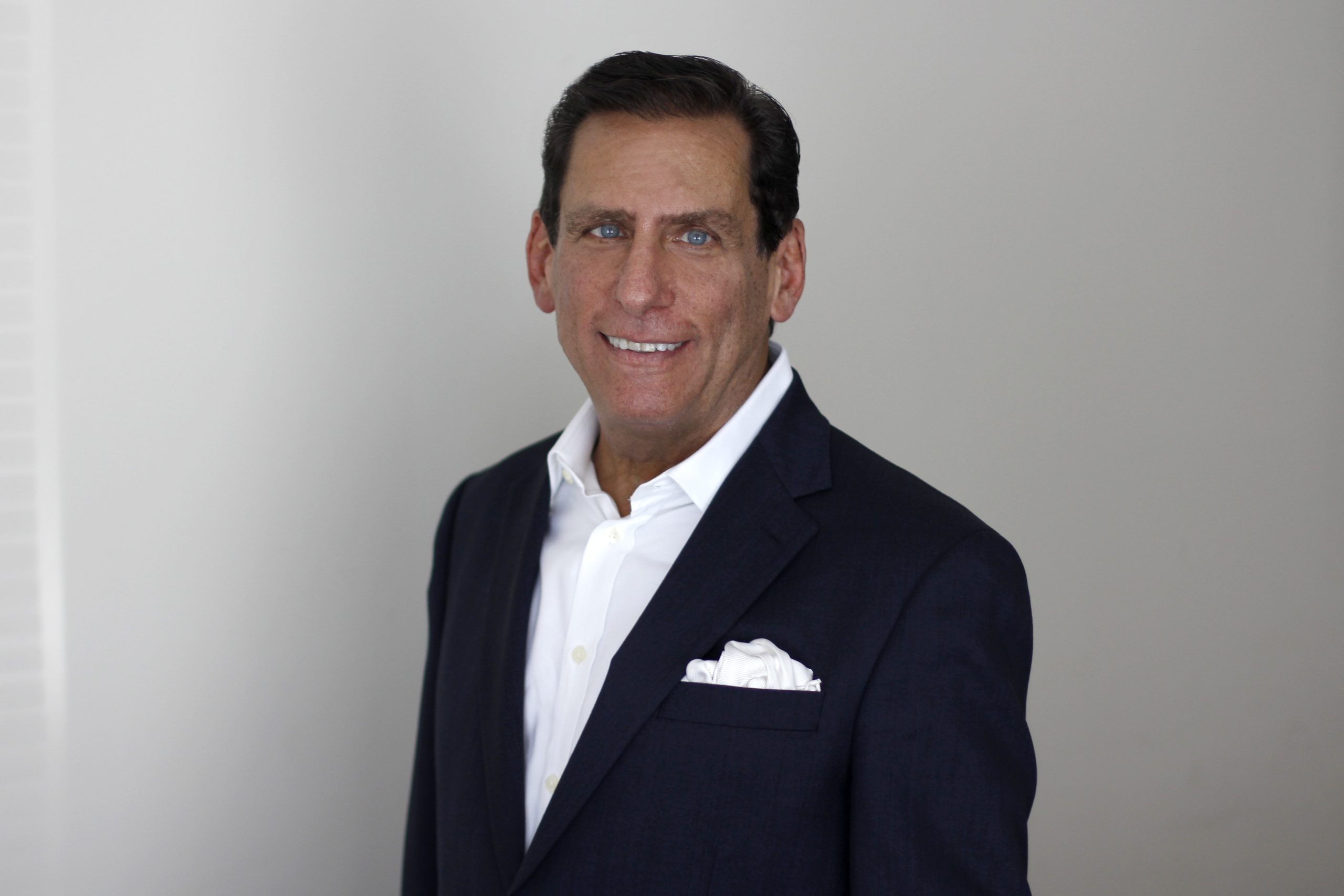

 This blog is provided by the IPR Measurement Commission in celebration of Measurement Month.People who know me well can confirm that I’m always talking about media measurement.When I’m on this topic, I often return to these five essential keys to media measurement that anyone and any organization can implement even if you don’t have much budget or are just starting your measurement journey.While this isn’t an exhaustive list, here are five easy-to-implement keys to media measurement that I mention the most often – just in time for AMEC Measurement Month.Always Look at Quantity + QualityIt’s easy to focus exclusively on quantity when examining media coverage: Lots of coverage translates into big numbers in a report. But those numbers can be deceiving without examining quality.For example, I’ve known PR pros who thought they were underperforming against competitors after looking at their share of voice (SOV) numbers. What they didn’t realize was that those larger competitor volumes were driven by crisis.Indeed, SOV can be a deceptive metric and should be viewed through a quality lens. That’s why you can’t look at quantity or quality in isolation.The caliber of your coverage can be measured in a few ways:1.) Simple quality metrics such as sentiment or priority outlet tiering 2.) More complex approaches, including weighting sentiment combined with other perception and recall factors to create an overall Media Impact ScoreContext is CrucialA number is just a number until it has context. So your brand received 10,000 mentions in Q4 – what does that mean?The best way to get context is to compare numbers with previous data and with that of your competitors.Comparisons Over TimeI prefer month-over-month media analysis benchmarking combined with annual reports to gauge year-on-year performance. This kind of benchmarking helps put numbers in context.For example, a company like Jergens or Kleenex – which tend to have higher usage in the winter – should examine the year-over-year performance of the company’s winter quarter.Competitive ComparisonsComparing your numbers to competitors can also provide context, as a brand examining its coverage in isolation may get the mistaken impression it’s performing poorly when it might not be.One important note about benchmarking: Always use a repeatable methodology and the same approach for each analysis for consistent comparison. Ensure Key Messages That Align With GoalsIt’s also important to ensure your coverage aligns with your goals. Incorporating a measurement framework, like AMEC’s Integrated Evaluation Framework, into your communications workflow can help determine these goals in advance.That’s important because you can then track the presence of key messages that align with these goals.Key topics can include reputation factors such as sustainability or diversity, equity, and inclusion (DEI). If the goal is sustainability, look for messages around sustainability. You can track all coverage for your brand and competitors to demonstrate your position in this area.You can then say that your coverage contains messages likely to create the perception that you’re a sustainable organization. While we can’t say that the message’s existence equates to perception, we can say that we’ve created content likely to influence our audience’s perception of our brand if combined with recall factors. Calibration Over CelebrationComms leaders and PR agencies must demonstrate their efforts are worth the investment. That’s how teams get budget, and bigger budgets allow us to do better and more impactful work.But in this drive to show value, sometimes celebrating wins starts to overshadow implementing key learnings. That’s a mistake, because re-calibrating your program based on media data is just as (if not more) important than celebrating successes.Along with the good, we must also look at the bad – and, hopefully, learn and adjust. Media analysis can help a brand identify gaps where competitors are excelling and they are not.Don’t fear areas of poor performance. Rather, use them for what they are: Excellent opportunities to learn and improve.Incorporate Data Around Business OutcomesMedia measurement can measure outputs (such as brand prominence) but hits a wall when measuring outcomes (such as online purchases).That’s because most business outcomes aren’t based on PR data at all – even though we know that PR is more effective than advertising at driving outcomes such as purchase intent.That said, we can use PR measurements (such as recall factors) as proxies for outcomes. Extensive research shows that branded visuals are extremely important when trying to get consumers to remember your brand.But these are still not outcomes: While the existence of branded visuals shows that an audience likely remembered your brand, they don’t say that for sure that the audience remembered your brand or took any action. Media measurement is crucial to demonstrate such outputs but on its own can only take you so far.This is when you must integrate outcome-based data in your analysis. Website traffic, sales, stock price, survey, and product user data are excellent to help show connections between PR outputs and business outcomes.Survey data, in particular, is excellent for gathering reputational data such as how likely someone would be to purchase from a brand. You don’t need to work with an expensive custom survey company to get this data, either – affordable options exist.Trackable links are another data source that can show clicks or purchases stemming from content.These are five of the easiest ways PR pros can improve their measurement programs. If you haven’t already, I hope you incorporate some of these research-based best practices into your daily workflows.
This blog is provided by the IPR Measurement Commission in celebration of Measurement Month.People who know me well can confirm that I’m always talking about media measurement.When I’m on this topic, I often return to these five essential keys to media measurement that anyone and any organization can implement even if you don’t have much budget or are just starting your measurement journey.While this isn’t an exhaustive list, here are five easy-to-implement keys to media measurement that I mention the most often – just in time for AMEC Measurement Month.Always Look at Quantity + QualityIt’s easy to focus exclusively on quantity when examining media coverage: Lots of coverage translates into big numbers in a report. But those numbers can be deceiving without examining quality.For example, I’ve known PR pros who thought they were underperforming against competitors after looking at their share of voice (SOV) numbers. What they didn’t realize was that those larger competitor volumes were driven by crisis.Indeed, SOV can be a deceptive metric and should be viewed through a quality lens. That’s why you can’t look at quantity or quality in isolation.The caliber of your coverage can be measured in a few ways:1.) Simple quality metrics such as sentiment or priority outlet tiering 2.) More complex approaches, including weighting sentiment combined with other perception and recall factors to create an overall Media Impact ScoreContext is CrucialA number is just a number until it has context. So your brand received 10,000 mentions in Q4 – what does that mean?The best way to get context is to compare numbers with previous data and with that of your competitors.Comparisons Over TimeI prefer month-over-month media analysis benchmarking combined with annual reports to gauge year-on-year performance. This kind of benchmarking helps put numbers in context.For example, a company like Jergens or Kleenex – which tend to have higher usage in the winter – should examine the year-over-year performance of the company’s winter quarter.Competitive ComparisonsComparing your numbers to competitors can also provide context, as a brand examining its coverage in isolation may get the mistaken impression it’s performing poorly when it might not be.One important note about benchmarking: Always use a repeatable methodology and the same approach for each analysis for consistent comparison. Ensure Key Messages That Align With GoalsIt’s also important to ensure your coverage aligns with your goals. Incorporating a measurement framework, like AMEC’s Integrated Evaluation Framework, into your communications workflow can help determine these goals in advance.That’s important because you can then track the presence of key messages that align with these goals.Key topics can include reputation factors such as sustainability or diversity, equity, and inclusion (DEI). If the goal is sustainability, look for messages around sustainability. You can track all coverage for your brand and competitors to demonstrate your position in this area.You can then say that your coverage contains messages likely to create the perception that you’re a sustainable organization. While we can’t say that the message’s existence equates to perception, we can say that we’ve created content likely to influence our audience’s perception of our brand if combined with recall factors. Calibration Over CelebrationComms leaders and PR agencies must demonstrate their efforts are worth the investment. That’s how teams get budget, and bigger budgets allow us to do better and more impactful work.But in this drive to show value, sometimes celebrating wins starts to overshadow implementing key learnings. That’s a mistake, because re-calibrating your program based on media data is just as (if not more) important than celebrating successes.Along with the good, we must also look at the bad – and, hopefully, learn and adjust. Media analysis can help a brand identify gaps where competitors are excelling and they are not.Don’t fear areas of poor performance. Rather, use them for what they are: Excellent opportunities to learn and improve.Incorporate Data Around Business OutcomesMedia measurement can measure outputs (such as brand prominence) but hits a wall when measuring outcomes (such as online purchases).That’s because most business outcomes aren’t based on PR data at all – even though we know that PR is more effective than advertising at driving outcomes such as purchase intent.That said, we can use PR measurements (such as recall factors) as proxies for outcomes. Extensive research shows that branded visuals are extremely important when trying to get consumers to remember your brand.But these are still not outcomes: While the existence of branded visuals shows that an audience likely remembered your brand, they don’t say that for sure that the audience remembered your brand or took any action. Media measurement is crucial to demonstrate such outputs but on its own can only take you so far.This is when you must integrate outcome-based data in your analysis. Website traffic, sales, stock price, survey, and product user data are excellent to help show connections between PR outputs and business outcomes.Survey data, in particular, is excellent for gathering reputational data such as how likely someone would be to purchase from a brand. You don’t need to work with an expensive custom survey company to get this data, either – affordable options exist.Trackable links are another data source that can show clicks or purchases stemming from content.These are five of the easiest ways PR pros can improve their measurement programs. If you haven’t already, I hope you incorporate some of these research-based best practices into your daily workflows.
 Angela Dwyer is Head of Insights at Fullintel, IPR Measurement Commission member, and IPRRC board member. She is an award-winning, media measurement expert who helps brands improve business results through data-driven, actionable insights.
...
Angela Dwyer is Head of Insights at Fullintel, IPR Measurement Commission member, and IPRRC board member. She is an award-winning, media measurement expert who helps brands improve business results through data-driven, actionable insights.
...